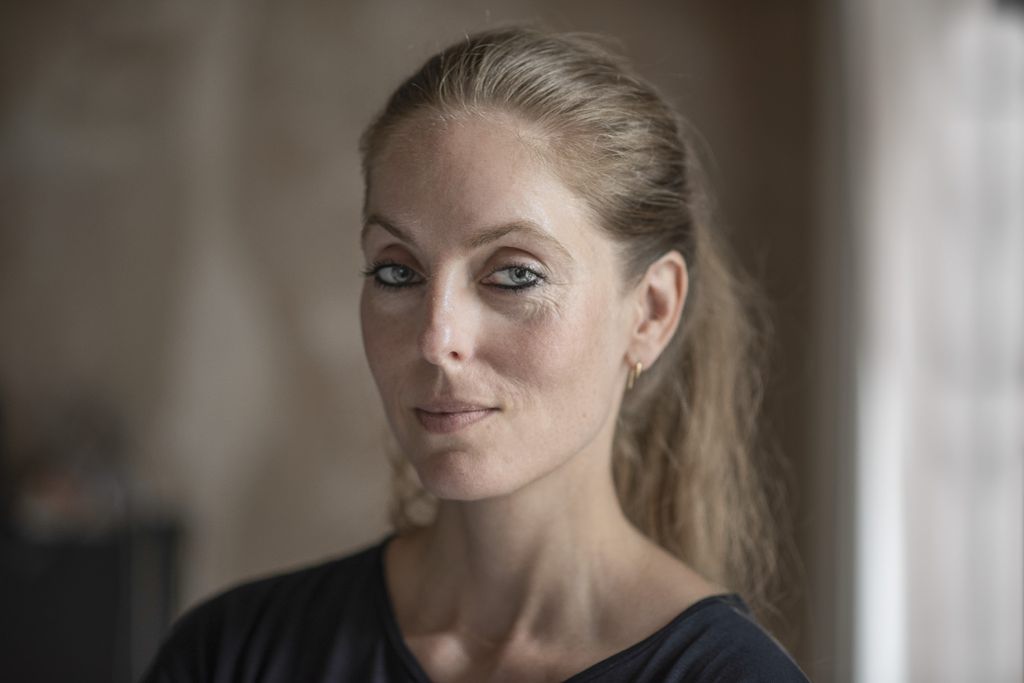“It’s motivating for me to engage in exchange with young theatre people.” After serving as the Burgtheater’s deputy artistic director, Alexandra Althoff found it important to get back in direct contact with young people working toward theatrical careers and return to the Max Reinhardt Seminar, where she’d already taught from 2013 to 2018. Since the 2022/23 winter semester, Althoff has been teaching the courses Inszenierungsanalyse (Production Analysis) and Angewandte Dramaturgie (Applied Dramaturgy) for first-year directing and acting students as well as for auditors from later years of study.

Production Analysis
In this course, Althoff and her students attend current productions that they then go about analysing in class. “The students learn to describe and interpret stage productions, doing both in a way that’s maximally unburdened by judgments of taste or value judgments. This is important in developing one’s own opinion of what one’s seen as well as a culture of feedback in which differing perspectives can coexist on an equal footing,” says Althoff. She selects the productions to be analysed with an eye to themes that she considers worthy of discussion—such as the portrayal of role models and violence onstage as seen in Florentina Holzinger’s Ophelia’s Got Talent. Her students also, as part of the performing arts festival Wiener Festwochen, had the opportunity to attend and analyse selected productions including Pieces of a Woman, Drive Your Plow Over the Bones of the Dead, and Antigone in Amazonas. “Supporting young artists is something that Wiener Festwochen takes seriously,” says Althoff of this important cooperative relationship. A highlight for the participating students was meeting Kata Wéber, author of Pieces of a Woman, for a discussion following its performance. Althoff was pleased by the lively exchange between them: “Having the self-confidence to present one’s own perspective on a scene to the author is something I’d like to encourage among the students.”
Applied Dramaturgy
Here, students engage with discourses that are currently playing out at theatres—for according to Althoff: “Over the past ten years, theatrical practice has witnessed a shift in thinking toward diversity, internationality, and open-mindedness, qualities that many venues are now striving for. One area where this can be seen is in ensemble structures and casts.” Places of training need to react to this development and support the formation of diverse student bodies. “When diverse ensembles become visible onstage, it has an encouraging effect—which causes the applicant pools for training programmes to become more diverse. The prospect of engagements at theatres as well as in film and television makes success seem possible.” In Applied Dramaturgy, Althoff attempts to relate contemporary dramatic works to ongoing theatrical discourses such as with reference to the Burgtheater play Die Ärztin by Robert Icke, a free adaptation of Arthur Schnitzler’s Professor Bernhardi. “In it, every actor must exhibit at least one difference vis-à-vis the figure they’re playing in terms of gender, race, or colour. It’s intriguing to discuss the question of what challenges such a concept might entail,” explains Althoff. For Althoff as a teacher, it’s clear: “Those who do theatre bear responsibility not only for their productions but also for the selection and casting of every play, and they also need to be aware of the symbols they employ and their contexts. In art, one can provoke—but one must not be naive, much less ignorant, when it comes to meanings.” This can result in insecurity or a desire to “do everything right.” However, Althoff hastens to emphasise: “Art isn’t a space that should only be about what’s nice and politically correct. This process is about dealing with materials that include unpleasant themes, exceptional situations, and human abysses as well as about probing the concrete materials to be dealt with. And a central point is the means by which a given thing is portrayed.”
Discovering and Falling in Love with Theatre
Althoff’s love of theatre was sparked during her schooling, thanks in part to dedicated teachers. Even back when she did school theatre, she realised how she preferred helping to guide the process over going onstage herself. Later on, she first entered an applied theatre studies programme in Gießen before moving to Leipzig to study dramaturgy, after which she pursued postgraduate film studies in Amsterdam. She then went on to work at several theatres as a dramaturge, a profession that requires “curiosity, stress-resistance, and diplomatic skill. Dramaturges build the bridge between a theatre’s executive level and its productions,” says Althoff. Responsibilities can be quite wide-ranging, from programming to the selection of directorial teams and ensemble casts, the development and implementation of educational and outreach programmes, and the conception of audience development strategies—in short: “Dramaturges shape theatres’ identities and serve as their think tanks.” About her production-specific dramaturgical work, Althoff says that she tries “to be a partner in the process, not just a critical authority.”
In recent years, however, she’s been concentrating on other activities. From 2019 to 2022, she served as deputy artistic director at the Burgtheater. And with her own theatre group Raum+Zeit, she has developed successful projects such as Antigone :: Comeback (premièred in 2019, Theater Chur, invited to the Schweizer Theatertreffen). In this production, visitors wandered through the theatre individually—at times wearing VR glasses—and embarked upon a virtual trip back through time to experience rehearsals of Brecht’s version of Antigone. The later project Berlau :: Königreich der Geister, which also featured VR technology, won the 2022 Friedrich Luft Prize for the Best Berlin Performance. Raum+Zeit is currently at work on the concept for a further project that will be situated at the interface between whole-room installation, visual art, live theatre, and virtual reality for a large audience. “I have the impression that lots of innovation is still possible in terms of virtual reality’s employment in theatre,” says Althoff. By no means, however, does she aim to work exclusively with this medium: “I love theatre as art in the here and now with all its material ephemerality.”

